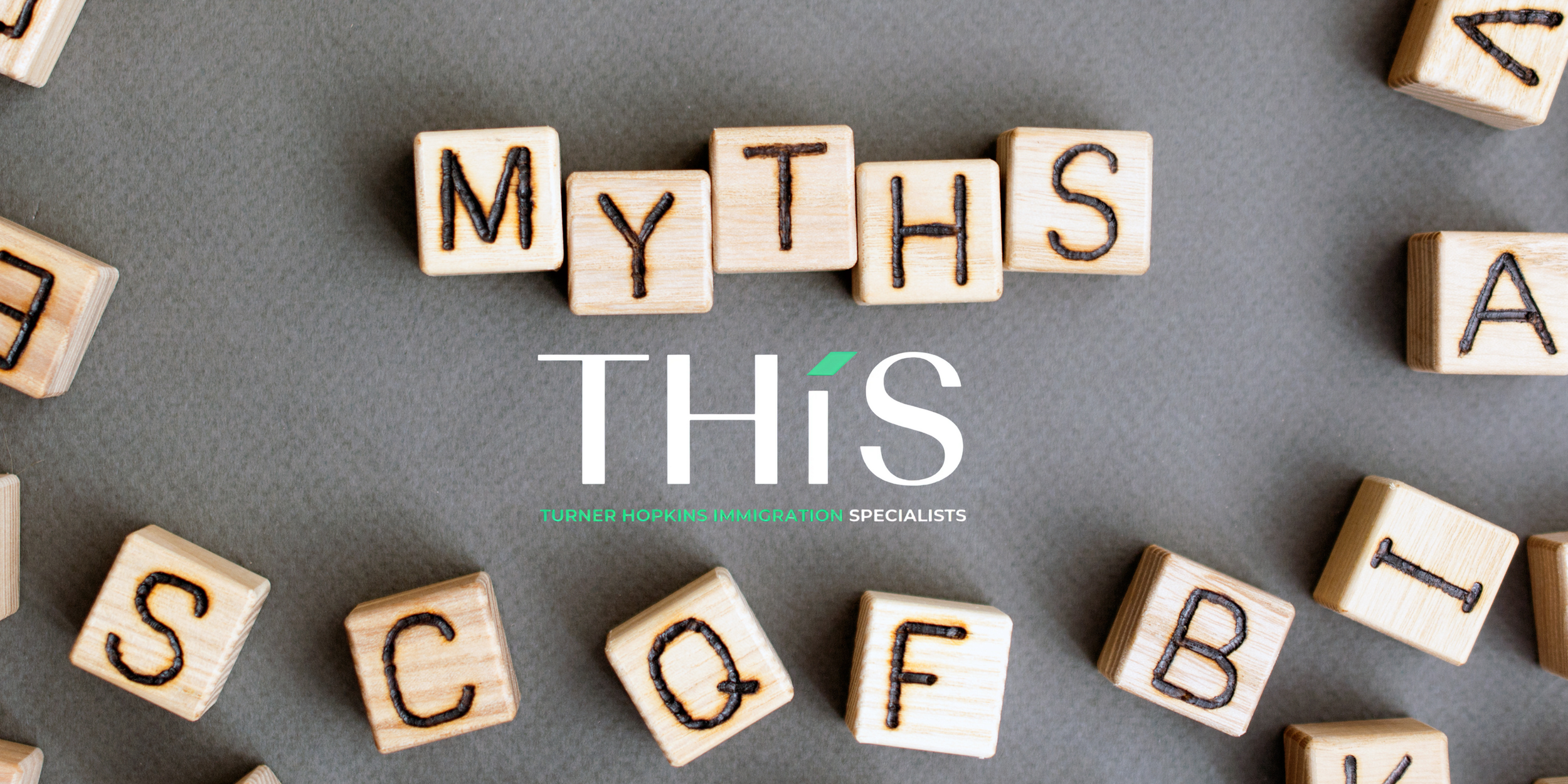Visa Myths - Busted
If you aren’t familiar with it, there is a great show called “MythBusters”, presented by two ex-Hollywood special effects artists, who take viewer submitted myths and put them to the test. The process usually consists of multiple explosions or physical injury and makes for some great entertainment (the injuries are never that bad). However myths also creep in to the visa process, perpetuated by a myriad of social media commentators, and well-intentioned people who simply have no idea what they are talking about.
The problem with these myths is that they have the potential to be disastrous for the potential migrant, who might be relying on that information to make a pretty significant decision for themselves and also their family. Being able to sort the myths from fact is crucial and becoming even more important as more and more people come to rely on the commentary available in social media or even AI. In fact AI is becoming a significant source of those myths, because whilst it might be able to summarise information of INZ’s website, it also tends to mix that up with other commentary available online that might not be close to fact.
So this week, we have a look at some of the common visa myths that tend to circulate within the migrant community, how to avoid confusing those myths with fact and then I also pick my top four myths from the last month.
Fact From Fiction
When it comes to the visa process, and because it is so complex, it is pretty to understand how these various myths might eventuate. - people who have gone through the process before, tend to be the first to give advice to those looking to follow. The problem is, the first set of people will have gone through their own process, with their own issues and how they navigated the process will differ to the next applicant that comes along.
Yes there is only one set of rules, but every applicant brings their own unique ingredients to the process, and therefore those rules will apply differently to them. Most social media groups, where migrants congregate are filled with people who are well-intentioned but utterly clueless as to how the process works it doesn’t take too long for one piece of misinformation to be treated like gospel within those groups.
Be Wary Of Social Media Advice
Remember, your situation will be different to every other migrant and so its important to identify how the process will work for you.
It is also not just former migrants who tend to litter these websites with the wrong information - just last night, I saw several Facebook posts from various “advisers” (I use that term loosely here), talking about visa rules, that haven’t even been released yet, but explaining to people how to plan their new lives in NZ on those non-existent rules.
It is really important to be able to separate out the marketing hype and ill-informed commentary of former migrants from the fact - particularly as it relates to your situation. Not an easy process, given the sheer volume of information available. Just yesterday I had a client who was in a bit of a panic, because AI had told her that once her current visa expired, even with a new application in process, she would become unlawful. Not true, in her particular case, and we were able to clarify that for her pretty quickly.
The problem is really two-fold, with the first issue being the enormous volume of information that is simply wrong, but also readily available and easily consumed. The second issue is that unless you know what you are doing, its hard to work out how even the correct information might apply to your very unique set of circumstances.
This is in part why the licensing scheme was set up, to give individuals like myself, the credentials to demonstrate that I at least know what I am doing, although even then not all advisers are created equal. If you are considering this move and trying to wade through all of the information available, getting yourself rather confused as to what is real and what isn’t - my advice is to get the right advice. Speak to someone with a track-record in dealing with the types of applications, that you might be looking to make, someone who can assess your situation objectively and give you a no-nonsense, realistic appraisal of your options and your chances.
My Top Four
I could easily fill an entire website with the myths and rumours that I have heard over the years and in fact one of the main topics of discussion with my clients, when they are first starting out, is to demystify the process for them, unravelling everything they might have heard or read on the internet. However if I was going to be pick four myths that have come up fairly recently, then these would be them…
“INZ will never find out”
You would be surprised at how many people assume that INZ will just believe everything they tell them, and in some cases this leads to complete disaster. Even the smallest of omissions or worse, lies, in an application can put you in a very difficult position. INZ goes to considerable lengths to verify the information it is given, particularly if you are applying for Residence. Old employers can be contacted, qualifications verified and character information scrutinised. If you think you need to hide something, then odds are you need some good advice on a) as to why you shouldn’t hide it and b) how to deal with the thing you don’t want to tell them about. In most cases, the fact you hide something is usually more significant than the thing you were trying to hide.
“It’s illegal to look for work in NZ”
Many migrants need to secure employment in order to make their longer term plans work and of course for some that might mean, making a trip to New Zealand to seek out that employment. I have lost track of the number of times, clients have been warned off, travelling here to do the job search because its “illegal” and this is usually advice given by advisers who may not be that familiar with the process. It is of course illegal to work in New Zealand without the appropriate visas, however there is nothing illegal or unlawful about attending interviews, talking to employers or researching your options. Of course, there is a right way to go about this and then a very wrong way and it pays to make sure you get some good advice on the right way, before you pack up your socks, shoes and CV to head out here for the job hunt.
“It’s not on my Police Clearance - I don’t have to declare it”.
Character issues and knowing what to declare, when to declare and even which Police Clearances to provide can be incredibly confusing, however one thing that is very clear, is that even if you have convictions that have been wiped or expunged from your record, INZ still wants to know about them. There are some exclusions to this for NZ convictions covered under the Clean Slate provisions, however overseas convictions and charges, even those that no longer appear, still need to be declared. In addition to this, if you hold citizenship of a country (with or without a valid passport) but have never lived there, you also still need to secure a Police Clearance from that country - another thing that trips a number of people up along the way.
“My work visa will lead to residence”.
This one is a big one…because many people are convinced that as long as they get a job offer here, then that will get them to residence. Two things to “bust” in that assumption. Your eligibility for residence under the skilled migrant category will depend on whether you have a job offer here or not, but there are also a lot of other factors to consider. You can secure a job offer and a work visa, and never be eligible for residence, which is a trap that some people fall into. Also, there is a misconception that if your work visa is approved, with a job that INZ have confirmed at a particular skill level, then that guarantees the same skill level for your residence application - which is not the case. For example, you might have a work visa approved, to work as a Skill Level 3, Office Manager, but when you apply for residence, INZ determines that job to be a lower level of skill (and then potentially declines you). The assessments between work visas and residence are separate and one doesn’t always guarantee the other.
There are so many more myths I could bust, and perhaps one day, I will work on a few more articles that cover some more of the common ones, but these four surfaced during the various calls I had with potential clients just in the last week. Its a pretty good example of how assumptions, myths and rumours can lead you down the wrong path.
Single Source Of Truth
So, if you considering the move, and trying to crawl your way out from under the avalanche of advice available, how do you get to that single source of truth - the one place where you know you can get the right advice. Well the trick there is to understand that if you are trying to work this out on your own, you might already be heading down the wrong track.
The Truth Is Out There
With so many sources of information available, it can be hard to work out what to rely on. Get advice from someone who knows the process inside and out.
The best way to establish what your options are, how the process will work for you and the things you need to be aware of is to have someone objectively review your circumstances and your options.
Of course, being biased, I would say that should be us, and that is a service we offer - an assessment of a person’s options with a very clear and realistic appraisal of your chances to make the move. However if you are doing your homework and speaking to advisers, there are a few simple things you can do to make sure, that the advice you are getting is worthwhile:
Ask your adviser for references, or testimonials or look at how long they have been licensed for.
A good assessment is one that explores your visa options and potential employment options as well.
Confirm whether that adviser will be handling your case or someone else might be involved.
Make sure they explain all your options and all the challenges involved. A good assessment looks at your process from every angle, to identify any obstacles that might be involved.
It all really comes down to trust, but ultimately if you can find an adviser that you do trust and can work with, then they should become your single source of truth. That adviser should tell you exactly what you need to know and when you need to know it and not just what you want to hear. This process can be complex, frustrating and involves lots of moving parts, so the person you chose to assist you needs to be keeping you informed and up to date, every step of the way.
Advice You Can Trust
In today’s world of instant information, it’s easy to see why so many visa “experts” pop up on social media feeds. Unfortunately, much of that advice is based on outdated rules, half-truths, or personal experiences that simply don’t apply to everyone. When it comes to something as important as your immigration goals and achieving a new life in a new country, relying on hearsay can lead to unnecessary stress, wasted time, and avoidable setbacks.
At Turner Hopkins Immigration Specialists, we believe sound immigration advice should be based on facts, not Facebook. Our team stays across every policy update and procedural change so you can make informed, confident decisions about your visa journey.
So before you take TikTok’s word for it, talk to someone who actually knows. Get in touch with our team today - we’re here to help you separate visa fact from myth and give you and your family the ability to move forward with confidence.
Until next week.







